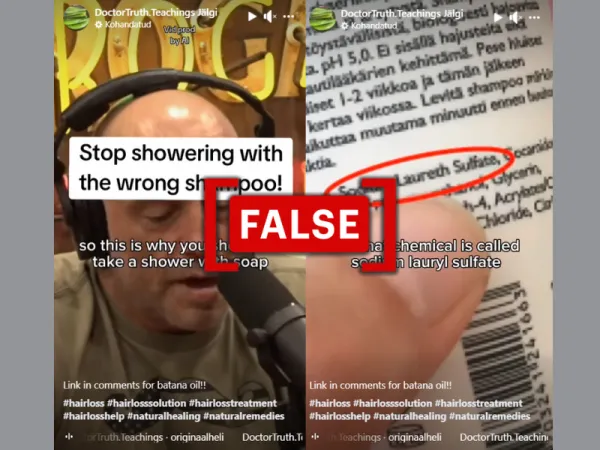By: Karin Koronen
August 1 2024
 Source: Facebook/ Screenshot/ Modified by Logically Facts
Source: Facebook/ Screenshot/ Modified by Logically Facts
While SLS can irritate the scalp, possibly affecting hair health, scientific evidence does not directly link it to hair loss.
Context
In a video shared by Doctor Truth Teachings on Facebook (archived here), Joe Rogan allegedly claims that Sodium lauryl sulfate (SLS), a chemical used in soap and hygiene products, causes hair loss. He proceeds to state that SLS is "actually known to be extremely artificial and toxic to the body," followed by a pitch to sell banana oil — a remedy produced by Doctor Truth. The video has also been shared on TikTok (archived here).
Doctor Truth is a popular brand of naturopathic medicine based in the U.S. Their products are often marketed as "Dr. Sebi approved," suggesting they follow health philosophies and practices similar to those endorsed by Dr. Sebi (real name Alfredo Darrington Bowman), a controversial figure in alternative medicine. Despite having a dedicated following, the medical community largely dismisses his remedies as unsubstantiated and potentially harmful. His practices have also faced legal backlash.
The video shared on Facebook and TikTok contains false information in two ways. Firstly, it wrongly attributes the claims to Joe Rogan. Secondly, it incorrectly states that SLS specifically causes hair loss.
In fact
Although the video has a "vid prod by AI" label featured in the beginning, the content has been edited to convey the information in the style of a podcast featuring Joe Rogan and Elon Musk. The clips of the pair have been presented out of context, and a voiceover has been added. Clips featuring Elon Musk have been taken from Joe Rogan Experience #2054, while those featuring Rogan are from another interview. Moreover, the host's mouth movement does not match the words of the voiceover. Thus, the video could be considered misleading, as it falsely attributes the previously stated claims to Joe Rogan.
Two screenshots of Joe Rogan. The first is from his interview with Elon Musk, where he can be seen wearing a wig and a white T-shirt. The second photo is from the clip used in the video warning people about SLS. (Source: YouTube/Facebook/Modified by Logically Facts)
Additionally, the claim that SLS causes hair loss is unsubstantiated. Sodium lauryl sulfate is a chemical commonly used in many personal care products, such as shampoo, toothpaste, and soap. Although prolonged or repeated exposure could potentially lead to scalp irritation, which might indirectly affect hair health, direct damage to hair follicles from SLS is not well-documented.
A 2015 peer-reviewed study in Environmental Health Insights found no scientific evidence that skin contact with SLS causes hair loss. Moreover, multiple scientific bodies, including the Cosmetic Ingredient Review, the U.S. Food and Drug Administration, and the U.S. Environmental Protection Agency, have deemed SLS safe to use in personal care and cleaning products if its concentration meets the regulations. However, it is important to note that the individual sensitivity to SLS can vary, and some people might experience adverse reactions even at low concentrations.
The claim that SLS is "extremely artificial" is also false. Although the chemical can be manufactured in a laboratory using petroleum, it can also be derived from renewable natural sources like coconut oil and palm kernel oil.
The verdict
While SLS can cause scalp irritation in some individuals, which might indirectly affect hair health, there is no conclusive scientific evidence that it directly causes hair loss. Neither is SLS necessarily "extremely artificial." These claims have been falsely attributed to Joe Rogan.